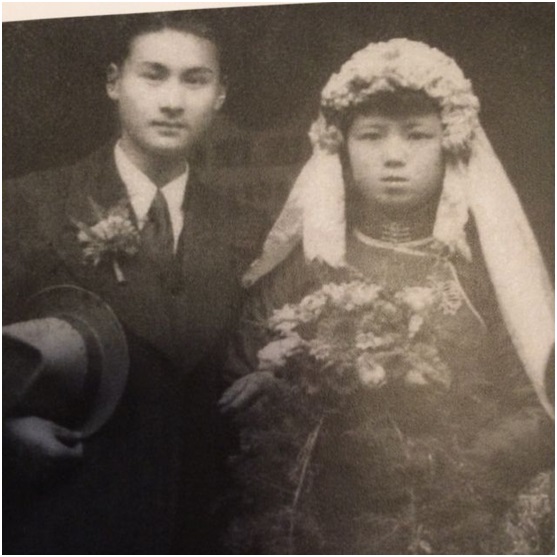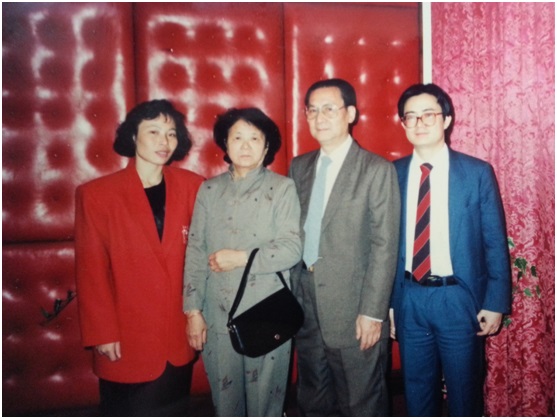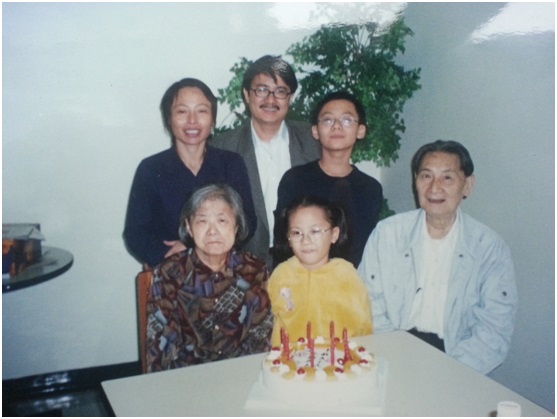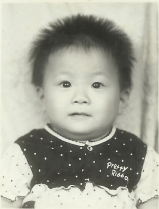search the site
The reflection of identities between my grandfather and me in different centuries
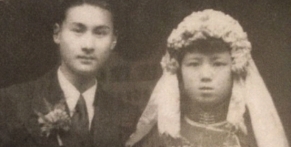 Personal photo; Wong Him Chin, Chelsea
Personal photo; Wong Him Chin, Chelsea
The reflection of identities between my grandfather and me in different centuries
Wong Him Chin, Chelsea; The Hong Kong Polytechnic University
Abstract–This article serves as a biographical essay of the author’s paternal grandfather and this ancestor’s life as a former general of the Chinese national youth league. Observing the pull of Hong Kong during the height of the Cultural Revolution of the 1950’s, the author continues this biographical exploration through her paternal grandfather’s immigration to Hong Kong, reflecting upon the issue of identity as reflected through Hong Kong culture, Chinese immigrant status, and the self.
This essay explores my identity through the biography of my paternal grandfather, Wong Hap Man, and provides information about Hong Kong immigration history, and the current situation of new immigrants. The paper will be divided into three core sections: i) the biography of my paternal grandfather; ii) discussion between the Mainland China immigrants in 1950s (the period of my grandfather migrated) and the new immigrants after 1990s in Hong Kong; and iii) exploration and reflection of my identity.
PERSONAL BIOGRAPHY
My grandfather passed away almost a decade ago and I found that my memories about him have been fading away. I remembered my grandfather was mysterious in my childhood time. I rarely had a chance to talk with him about his past. Because of this, I tried to explore the past of my grandfather by having an interview with my father.
My paternal grandfather, Wong Hap Man, was born in 1921 in a family of four brothers and two sisters in Fujian Province, China. When my grandfather was 21 years old, he met my grandmother through a blind date and married her. After one year, they had their first child, my aunt. My grandfather and grandmother in total had four sons and two daughters. In 1945, my grandfather obtained his first job as a secondary school teacher and worked in the school for three years. Since he was interested in politics, he joined the nationalist party and a youth league called San Qing Tuan (三青團) in 1947. As my grandfather actively participated in many activities in San Qing Tuan, he finally became the director general of San Qing Tuan and led 1000 people in the league. Since the nationalist party and communist party opposed each other, my grandfather escaped from Mainland China.
Fig. 1. Wedding Photo of My Paternal Grandparent in 1942
My grandfather successfully arrived at Hong Kong in 1959. In first few years, my grandfather was not able to take his family members (included my grandmother, father, uncles and aunts) in Hong Kong. He left the whole family and lived with a kinfolk family alone. In fact, many Chinese immigrants had the similar situation with my grandfather in 1950s. According to Lam and Liu (9), immigrants from China came to Hong Kong mostly for reuniting with their families or for political reason in 1950s. My grandfather was waiting the family to join him. He received his second job in a currency exchange shop this time. After several years, my grandfather got a better job as a warehouse manager in department store. As time went by, my father, uncles and aunts all had the permissions to come to Hong Kong. Meanwhile, my grandfather saved enough money to purchase his first residential property in Hong Kong. The property was an emblem as “home” in the values of my grandfather which he set up and then settled down his family. He finally got my grandmother with whole family and reunited in 1980.
Although the family rejoined, it faced new challenges in Hong Kong. Since all the family members were the “new immigrants” in Hong Kong, it was hard for them to obtain a job. Immigrants were mostly illegal, young and relatively uneducated in 1981 (Lam and Liu 53). Manual labour in manufacturing industry required general skills. Yet jobs in service industry required more intensive personal interaction, language skills, social and cultural skills. In that case, my father faced the similar situation. My grandfather faced the same situation. None of the family members found jobs. In the meantime, language was important for the family to communicate with the locals. Language was a key route into a place and its culture. People would be cut off from Hong Kong local culture, workplace culture, new media and gossip without sufficient language skills (Knowles and Harper 233). After understanding the situation, my father, uncle and aunt started to learn the main language, Cantonese, from my grandfather and daily life. They tried every opportunity to practise. They also watched the Cantonese-based TV programmes for practising Cantonese. These helped them to learn the culture and language of Hong Kong quickly. Finally, my grandfather and his family overcame all of these problems and had positive, vigorous and energetic attitude to face the challenges in future. The seniority of my family also encouraged the young generation through this immigration history of my grandfather.
Fig.2. My Grandfather with His Wife and My Parents (From Left to Right: My Mother, Grandfather, Grandmother, Father)
My grandfather’s family gradually integrated into society, and finally settled down into Hong Kong. As my grandfather lived in Hong Kong for many years, he developed the loyalty to Hong Kong. Even though there was a steady outflow of emigrants from Hong Kong from 1980 to 1986, my grandfather remained. At that time, the three major destination countries of emigrants were Canada, the United States and Australia. They were followed by Singapore, New Zealand and other countries (Lam and Liu 74).These destinations were attractive, and even now they are popular notion. My grandfather did not want to emigrate other countries since he believed Hong Kong was his “home” and did not want to have second migration. After a few years, at 65 years of age, my grandfather retired from the department store. After retirement, he enjoyed his life with my grandmother. They made overseas trips and took care of their grandchildren. It was sad that my grandfather passed away in 2005 when he was 74 years old. Before the death, he requested to be buried back home in the Mainland. My grandfather had almost half of his life in Mainland China and the other half in Hong Kong, but he never forgot the place where he was born.
Fig.3. Celebration of My Grandfather’s 60 Years Old Birthday
EXPLORATION BETWEEN THE IDENTITY OF HONG KONG PEOPLE AND CHINESE IMMIGRANTS
Hong Kong was attractive to my grandfather and is still very attractive to other Chinese citizens that migrate to Hong Kong. There were three factors explaining the charm of Hong Kong to the immigrants. First, Hong Kong has a geographic advantage. Hong Kong is located in South East Asia and on the southern coast of Mainland China. Hong Kong is the gateway between the East and West and is the excellent trading platform because of its coastal position. It is a significant magnet and has accumulated a stratified migrant force such as Indian, Filipino, European and American (Knowles and Harper 15). This resembles other migration magnets in the Asia Pacific region including Shanghai, Singapore and the Middle East, especially Dubai and Saudi Arabia. Second, Hong Kong has a superior economical system. It not only has free trade and investment policy, but also has the low and simple taxation. These factors attract global corporations and their labour forces, even though their fluctuating economic fortunes. Third, Hong Kong has a unique political and cultural system, the “one country, two systems” policy which made Hong Kong distinctively different from the Mainland (Zhang 506). Yet, Hong Kong has a close connection with China mainly since it became the growth hotspot of the early twenty-first-century and major force among global economies. Hong Kong is also a place in transition between an old colonial and a new postcolonial global matrix. With these three factors, Hong Kong has become a special place and attracts many immigrants from the world, particularly Mainland China.
Recent immigration from Mainland China increased in Hong Kong; however they are unwelcome by Hong Kong people compared with the earlier immigrants in my grandfather’s time. There were two major factors that may lead to this consequence. First, it is language problem. In Hong Kong, most people speak Cantonese and English is also important because Hong Kong is an international city. Nevertheless, some immigrants from Mainland China may not be able to speak Cantonese, while their English is likely to be poor compared with the local Hong Kong people. The poor language skills are a part of the obstacles for many new Chinese immigrants to integrate into local society easily. Furthermore, low integration is making it challenging for new immigrants to get well-paid jobs. It is possible that this makes many Hong Kong people think new immigrants are not working hard and rely on use of welfare.
The earlier immigrants (including my grandfather) had a totally different treatment from the locals. Through anecdotal examples, it seems the attitude of locals at that time was friendly compared with locals in present. There are three main reasons for the different attitudes towards the earlier and recent immigrants. First, the immigrants are different in terms of socioeconomic characteristics. The earlier immigrants in my grandfather’s time integrated into Hong Kong society and had characteristics similar to the native residents. The new immigrants are very different with Hong Kong people. For example, some of the new immigrants might spit on the street and throw rubbish anywhere. Secondly, immigrants in the last century were different from the new immigrants nowadays because of a “cohort effect.” My father mentioned that our family did not know how to speak Cantonese after migrating to Hong Kong; but they studied hard to learn Cantonese, and hoped that they could integrate into society through communication. The language strengthened their loyalty to Hong Kong and helped the family assimilate into the community. Thirdly, the new generation of Hong Kong people had less tolerance to new Chinese immigrants compared to the earlier Hong Kong residents. Therefore, it is the differences in cultures and level of tolerance in the old and new centuries that cause the local problems between Hong Kong people and new immigrants. Since the growing environment of the locals in past and present are different, they may have different attitudes when facing immigrants. The locals in past mostly were not the native Hong Kong people, they were also from different countries and lived in Hong Kong for several years. Therefore, they can accept the immigrants because of similar experiences. On the other hand, the locals in present day mostly are born in Hong Kong. They have not migrated from other countries, so they might not have empathy with the immigrants.
In fact, the most important reason that some Hong Kong people resisted Chinese immigrants is the identity crisis. This can be seen in the study of Mathews, Ma, and Liu which reported on a woman completing a departure form (16). The woman was not very sure which nationality she should fill in. British? British Hong Kong? Hong Kong? Chinese? This critical issue has gone beyond a form filling. It shows the confusion of Hong Kong people about which country they belong to. Most of the Hong Kong people do not perceive they belong to any country, and as former British colonists, most people in Hong Kong feel less allegiance to Great Britain especially since they have no right of adobe in the United Kingdom. Similarly, even though China was the cultural, ethnic home and ancestral root for most of the Hong Kong people, China is Communist, and many Hong Kong people are opposed to Communism. Finally, as residents of a Special Administrative Region (SAR), Hong Kong is not a country and probably could never become a nation due to the geographic proximity and historical chain to Mainland China.
The Hong Kong identity crisis appeared in the 1970s. It remained expressly steady when traced back to the surveys over the past twenty years. A survey in 1985 showed 59.5% respondents identified themselves as Hong Konger and 36.2% as Chinese (Mathews, Ma, & Lui 26). Ten years later, fewer people regarded themselves as Hong Konger or Chinese and 15.4% as both. The statistics show that there has been a subtle slant towards a mixed Chinese identity after Hong Kong returned to China. Fewer locals identify themselves as being only Hong Konger, but are beginning to identify themselves as mixed identities (Zhang 507). In general, the people who recognised themselves as Hong Konger were often well educated, middle class and younger, yet female (Mathews, Ma, & Lui 26). Perhaps this is evidence that different social classes adopt different attitudes in the identity issue.
People in Hong Kong have a strong cultural identity and political values with particular ethos. They think they are basically different from the Mainland Chinese. Hong Kong people seem wary in the evaluation of Mainland Chinese, perceiving the Mainland Chinese are less disciplined, less outspoken, less liberal and less westernized than people in Hong Kong (Mathews, Ma, & Lui 98). The value of Hong Kong people also was different from the Mainland people, especially the political values. Many people are concerned the political influences of China in Hong Kong after the handover. A number of occurrences regarding political intervention from China were the evidence for their anxiety. The confrontation and dread complicated the re-“China-lisation.” Communists still were regarded as invaders, and the reunion of China and Hong Kong was a way to be seen as the end of Hong Kong’s way of life. Hong Kong people are also concerned about the rise of political reform, and the process of decolonisation since the 1990s that made many Hong Kong people seek for democracy (Mathews, Ma, & Lui 100). For instance, when considering “valuing freedom of speech”, “valuing press freedom”, “valuing privacy” and “valuing equality”, there was a very large gap between the self-perception of Hong Kong people and the Mainland people, particularly the excessive attribute “outspoken” and “Westernization”. Hong Kong people still remain sensitive to the contradistinction between the authoritarian Chinese state and free, pluralistic Hong Kong society; and they tend to oppose the Communist government, regarding the Chinese government and immigrants as possible “invaders”.
In fact, the identity crisis has become more serious in recent years. Hong Kong people especially in my generation were born in 1990s, the time of the China and Hong Kong reunion. We grew up in the freest time of Hong Kong which included the transition period from the British government to the China government. This generation benefited from this situation; we have the freedom and time to develop our local unique multi-culture. When we introduce ourselves, most of us recognise each other as Hong Kongers. Since our own culture is quite different from the China culture, it becomes difficult for Hong Kong youth to identify themselves as Chinese, and some may treat the recent Chinese immigrants in an unfriendly way. It might be a sign about their dissatisfaction with and even opposition to the China government.
MY OWN IDENTIFICATION
The exploration and review of my grandfather’s biography, social problems and differences between people in Hong Kong and China have helped me better understand and identify myself. From the reviewed literature, it seems most of the well-educated, middle class and younger females identified themselves as Hong Konger, but denied being Chinese. On the other hand, although Hong Kong people admit the identity of Chinese, they do not give up the identity of Hong Konger either. In my opinion, I prefer to be recognised as a Hong Kongers as some of the people that live in Hong Kong. As time goes by, Hong Konger are restricted by laws related to right-of-abode, such as the 7 year residency policy or being born on Hong Kong soil. I can understand the concerns of Hong Kong people about the political problems: they want to distinguish themselves from the Hong Kong resident and the Chinese by regarding themselves as “Hong Kongers”.
Since Hong Kong has its own local unique multi-culture, Hong Kong youth also hope the local culture can be kept and unchanged. Hong Kong people think China’s government may be an “invader” of the local political system, culture and (especially) everyday lifestyle. Therefore, they oppose the China government vigorously and ignore the Chinese identity in these few years. However, China is the root of Hong Kong culture and ethnicity that should not be forgotten or ignored. As a well-educated, young university student, I would not identify myself as Hong Konger as the survey results have suggested. I am more likely to choose the same choice that my paternal grandfather did: a mixed-identity. I cannot deny I am Chinese because of the family history and ancestral root; yet, I am also a person born in Hong Kong and I live in Hong Kong my entire life. My grandfather chose both the Mainland China and Hong Kong as his “home”… and I would like to make the same choice as him.
CONCLUSION
To conclude, people change their identity through distinct factors, such as history, political crisis, and society. This study helped me to know more about the past two generations of my family and the problems between local Hong Kong people and new Chinese immigrants. More importantly, the study has helped me to better understand my grandfather’s and my own identity.
Works Cited
Bailey, Adrian J. and Agnes K.Y. Law. “Return Migration and Hong Kong’s Diverse Circuits of Mobility.” Asian Geographer 30.1 (2013): 21-35. Web. 30 Sept. 2014.
Chou, Kee Lee. “Familial Effect on Child Poverty in Hong Kong Immigrant Families.” Social Indicators Research 113.1 (2012): 183-195. Web. 30 Sept. 2014.
Eitel, Ernest J. Europe in China: The History of Hongkong from the Beginning to the Year 1882. London: Luzac & Co., 1895. Web. 30 Sept. 2014.
Knowles, Caroline, and Douglas Harper. Hong Kong Migrant Lives, Landscapes, and Journeys. London: The University of Chicago Press, 2009. Print.
Lam, Kit Chun, and Pak Wai Liu. Immigration and the Economy of Hong Kong. Hong Kong: City University of Hong Kong Press, 1998. Print.
Mathews, Gordon, Eric Kit-Wai Ma, and Tai Lok Lui. Hong Kong, China: Learning to Belong to a Nation. New York: Routledge, 2008. Print.
Ngo, Tak Wing. Hong Kong’s History: State and Society under Colonial Rule. London / New York: Routledge, 2008. Print.
Zhang, Mengmengand Sabina Mihelj. “Hong Kong Identity and the Press–Politics Dynamics: A Corpus-Assisted Discourse Study.” Asian Journal of Communication 22.5 (2012): 506-527. Web. 30 Sept. 2014.
BIO
Wong Him Chin, Chelsea is a final year student at the Hong Kong Polytechnic University, studying for her Bachelors in Fashion and Textiles, (Intimate Apparel stream). She loves to explore different biographies and believes that she can understand a person better through those stories.
REFLECTION
This biography is an assignment of the subject Multiethnic Identities and Lives. However, I became interested in this study because it is the first time I have written about my grandfather, and I hope that it will serve as a worthy commemoration and record of him.















